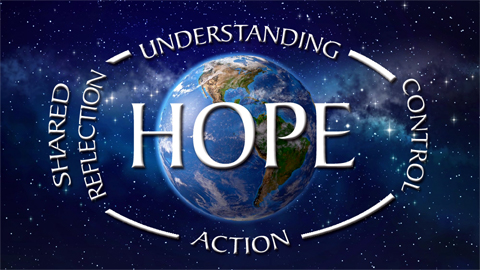 |
 |
|
February 10, 2022 Growing the Business of Hope “…hope has become a depleted resource. There is a mounting realization on the part of the world’s people that the decades ahead are set to bring with them challenges among the most daunting that the human family has ever had to face…. “May you succeed in giving hope to those who know not where to find it in a world disoriented and adrift… — The Universal House of Justice to the Bahá’ís of the World, 25 November 2020 
Decades ago, the European Bahá’í Business Forum (EBBF) began promoting the idea that enterprises could “do well by doing good”, applying the teachings of Bahá’u’lláh to running a business. In 2017, the Universal House of Justice, the democratically elected body conceived by Bahá’u’lláh to guide His followers, wrote a letter to the Bahá’í world that centred on economics. It argued that “wealth must serve humanity”: “…time
and again, avarice and self-interest prevail at the expense of the
common good…. The teachings of the Faith leave no room for doubt: there
is an inherent moral dimension to the generation, distribution, and
utilization of wealth and resources.”
Daniel Truran, based in Spain, is Director-General of EBBF (now called Ethical Business Building the Future – EBBF.org). To an online audience of over 50 in 2022’s first “Big Ideas” presentation, he touched on the need for universal participation in righting the material imbalances of society, as urged in that 2017 letter. “The aim is to learn about how to participate in the material affairs of society…. [T]he moral duty to lead a coherent life demands that one’s economic decisions be in accordance with lofty ideals…” Truran also emphasized the creative power of unity, and the increasing global interdependence of all peoples and systems. Thousands of businesses, known as “B Corps”, follow a “Declaration of Interdependence” promoting “business that works for everyone.” Truran cited examples such as the Bahá’í-inspired SecondMuse.com – it has two CEOs, one female, one male – which seeks collaborative ways to help communities build sustainable economies. They address his essential question: “Where can we find the hope to build the future that we need?” When he wondered “who has
hope in a better future?”, many virtual hands were raised, unlike most
audiences he encounters as a business strategist. Another letter of the
Universal House of Justice to Bahá’ís in November 2020 states:
“Your
resilience and your unwavering commitment to the well-being of those
around you […] have filled us with tremendous hope…. May you succeed in
giving hope to those who know not where to find it in a world
disoriented and adrift.…”
Daniel Truran asked “Think of the climate emergency. How do we help move from eco anxiety to eco action?” He proposed a four-stage process that creates a feedback loop of hope. First, understanding: we must investigate reality for ourselves, rather than burying our heads in distractions, and recognize mass media’s distorted picture of reality. “Be that breath of fresh air!” Truran urged, by focusing on constructive processes and events, and on all kinds of beauty. Understanding, alongside personal volition and positive social movements, creates a sense of control, of agency. “What is my role in society?” Work in your neighbourhood, with your colleagues, says Truran, but know also that in a hyper-connected world, our approach may also become “a model and an inspiration to millions!” Intimately related to feeling agency is the imperative to take action. We need some sense of control in order to act, but action also reinforces that agency. This willingness to do can be encouraged, in ourselves and others – “Spark volition!” Truran challenged. The fourth nourisher of hope is shared reflection. “We underestimate how much our convictions can change conversations around us,” noted Truran. Much of his own work, and that of Bahá’í communities everywhere, is to thoughtfully assess action, and to “co-create visions of the world”. Whether in a neighbourhood setting, or a company striving to “do things differently, and to do things right”, or in the remarkable recent conference of the Universal House of Justice with its 81 appointed continental Counsellors, such consultations engender and consolidate hope. The loop strengthens: shared reflection builds understanding, confers agency, and inspires ever more hopeful action. Daniel Truran punctuated his hope-building message with the words of ‘Abdu’l-Bahá, Bahá’u’lláh’s son and exemplar, to Americans advocating peace and unity in 1912: “…it
is my hope that the Sun of Truth may illumine all humanity…. Mere
knowledge of principles is not sufficient. We all know and admit that
justice is good, but there is need of volition and action to carry out
and manifest it…. All of us know that international peace is good […]
but volition and action are necessary before it can be established.”
|
|
|